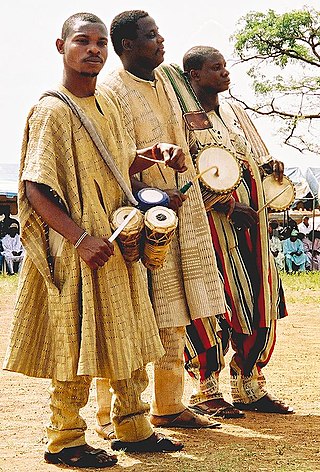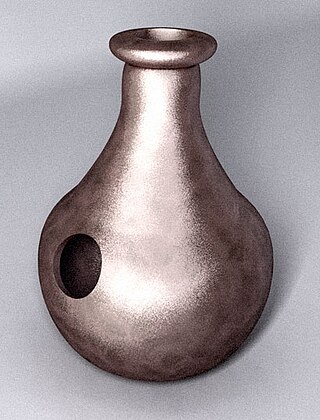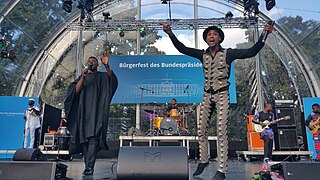Related Research Articles
Highlife is a Ghanaian music genre that originated along the coastal cities of present-day Ghana in the 19th century, during its history as a colony of the British and through its trade routes in coastal areas. It encompasses multiple local fusions of African metre and western jazz melodies. It uses the melodic and main rhythmic structures of traditional African music, but is typically played with Western instruments. Highlife is characterized by jazzy horns and guitars which lead the band and its use of the two-finger plucking guitar style that is typical of African music. Recently it has acquired an uptempo, synth-driven sound.
There are many styles of traditional and modern music of Ghana, due to Ghana's worldwide geographic position on the African continent.

The music of Nigeria includes many kinds of folk and popular music. Little of the country's music history prior to European contact has been preserved, although bronze carvings dating back to the 16th and 17th centuries have been found depicting musicians and their instruments. The country's most internationally renowned genres are Indigenous, Apala, Aurrebbe music, Rara music, Were music, Ogene, Fuji, Jùjú, Afrobeat, Afrobeats, Igbo highlife, Afro-juju, Waka, Igbo rap, Gospel,Nigerian pop and Yo-pop. Styles of folk music are related to the over 250 ethnic groups in the country, each with their own techniques, instruments, and songs. The largest ethnic groups are the Igbo, Hausa and Yoruba. Traditional music from Nigeria and throughout Africa is often functional; in other words, it is performed to mark a ritual such as the wedding or funeral and not to achieve artistic goals. Although some Nigerians, especially children and the elderly, play instruments for their own amusement, solo performance is otherwise rare. Music is closely linked to agriculture, and there are restrictions on, for example, which instruments can be played during different parts of the planting season.

Soukous is a genre of dance music originating from the Democratic Republic of the Congo and the Republic of the Congo. It derived from Congolese rumba in the 1960s, with faster dance rhythms and bright, intricate guitar improvisation, and gained popularity in the 1980s in France. Although often used by journalists as a synonym for Congolese rumba, both the music and dance associated with soukous differ from more traditional rumba, especially in its higher tempo, song structures and longer dance sequences.
Fújì is a genre of Yoruba popular music that emerged in Nigeria in the 1960s. It evolved from the improvisational wéré music also known as ajísari (meaning "waking up for sari", performed to awaken Muslims before dawn during the fasting season of Ramadan. Fuji music was named after the Japanese stratovolcano-mountain, Mount Fuji by Alhaji Sikiru Ayinde Barrister. It features energetic beats, diverse Yoruba rhythms, and call-and-response vocals. Fuji's influence extends into contemporary music, with its hooks and rhythms frequently appearing in Nigerian hip hop.

The music of West Africa has a significant history, and its varied sounds reflect the wide range of influences from the area's regions and historical periods.

Yoruba music is the pattern/style of music practiced by the Yoruba people of Nigeria, Togo, and Benin. It is perhaps best known for its extremely advanced drumming tradition and techniques, especially using the gongon hourglass shape tension drums. Yoruba folk music became perhaps the most prominent kind of West African music in Afro-Latin and Caribbean musical styles; it left an especially important influence on the music used in Santería practice and the music of Cuba.
Afro rock is a style of rock music with African influences. Afro rock is a dynamic interplay between Western rock music and African musical elements such as rhythm, melodies and instrumentation. Afro rock bands and artists in the late 1960s and early 1970s included Osibisa, Assagai and Lafayette Afro Rock Band.

Stella Chiweshe was a Zimbabwean musician. She was known internationally for her singing and playing of the mbira dzavadzimu, a traditional instrument of the Shona people of Zimbabwe. She was one of few female players, and learned to play from 1966 to 1969, when other women did not.

Igbo music is the music of the Igbo people, who are indigenous to the southeastern part of Nigeria. The Igbo traditionally rely heavily on percussion instruments such as the drum and the gong, which are popular because of their innate ability to provide a diverse array of tempo, sound, and pitch. Igbo music is generally lively, upbeat, and spontaneous which creates a variety of sounds that enables the Igbo people to incorporate music into almost all the facets of their daily lives. Some very popular Igbo musical styles are Igbo highlife, Ogene, Igbo gospel.

Chief Stephen Osita Osadebe, often referred to as just Osita Osadebe, was a Nigerian Igbo highlife musician from Atani. During his career spanning over four decades, he became one of the best known musicians of Igbo highlife. His best-known hit was the 1984 single "Osondi Owendi", which established him as a leader in the highlife genre and was one of Nigeria's most popular records ever.
Roy Chicago
Igbo highlife is a contemporary musical genre which combines highlife and Igbo traditional music. The genre is primarily guitar-based music, with a rare characteristic blend of horns and vocal rhythms. Igbo highlife lyrics are sung mostly in Igbo with occasional infusion of Pidgin English. One of the most influential composers and performers of the music is Chief Stephen Osita Osadebe whose career spanned over 40 years. Osadebe's discography comprises numerous popular songs including the 1984 hit "Osondi Owendi" which launched him on the world stage as a pioneer of the Igbo highlife genre.

Bantu is a 13-piece band based in Lagos, Nigeria. Their music is a fusion of Afrofunk, Afrobeat, highlife and Yoruba music. The group features multi-instrumentalists and singers who perform as a collective.
Celestine Ukwu was a Nigerian Igbo highlife musician during the 1960s and 1970s, best known for his hit songs "Ije Enu", "Igede" and "Money Palava". Described as a "prolific and outstanding composer" by music critic Benson Idonije of Radio Nigeria Two, Ukwu's works have been featured on various world music compilations including The Rough Guide to Highlife and The Rough Guide to Psychedelic Africa.

The Cavemen are a Nigerian highlife band consisting of sibling duo Kingsley Okorie, a bassist, and Benjamin James, a drummer. They were brought to the limelight by Lady Donli and are known for their live performances. They won the 2020 Headies Award for the Best Alternative Album.
Ikwokirikwo (Ikwokilikwo) is a high-tempo style of Igbo highlife music influenced by Ogene, which gives the style its fast-paced signature. The style emerged in the early 1970s. It was popularized by the Oriental Brothers and later by Kabaka Guitar Band. It was pioneered by Oliver De Coque and Prince Nico Mbarga.

Like Father, Like Son is the debut studio album by Nigerian singer Charles Onyeabor which was released on 17 November 2023. The album comprises twenty tracks and was recorded in English, Nigerian Pidgin, Igbo and Italian. Consisting of genres; rhythm and blues, funk, Afrobeats, hip hop, dance and highlife, Like Father, Like Son explores themes "such as gratefulness, solemnity, appraisal, encouragement, pride, life of the party, and regrets, love, heartbreaks, amongst others".
Ifechukwu Mercy Michael professionally known as Ifé a Nigerian singer-songwriter and performer. She is known for the Afro-Soul, Afrobeats and alte genres. She released her first single 'Nwa' in 2018 and gained prominence after the release of "Ozo" featuring Ụmụ Obiligbo in 2019.
References
- ↑ "Owerri Bongo Biography, About, Net worth, Age, Family & More". HighlifeNg. 8 February 2022. Retrieved 3 September 2023.
- ↑ "What is Bongo's True Identity? - Afrocritik". 6 April 2023. Retrieved 3 September 2023.
- ↑ "What is Bongo's True Identity? - Afrocritik". 6 April 2023. Retrieved 3 September 2023.
- ↑ "What is Bongo's True Identity? - Afrocritik". 6 April 2023. Retrieved 3 September 2023.
- ↑ Salawu, Abiodun; Fadipe, Israel A. (31 May 2022). Indigenous African Popular Music, Volume 1: Prophets and Philosophers. Springer Nature. ISBN 978-3-030-97884-6.
- ↑ "What is Bongo's True Identity? - Afrocritik". 6 April 2023. Retrieved 3 September 2023.
- ↑ Salawu, Abiodun; Fadipe, Israel A. (31 May 2022). Indigenous African Popular Music, Volume 1: Prophets and Philosophers. Springer Nature. ISBN 978-3-030-97884-6.